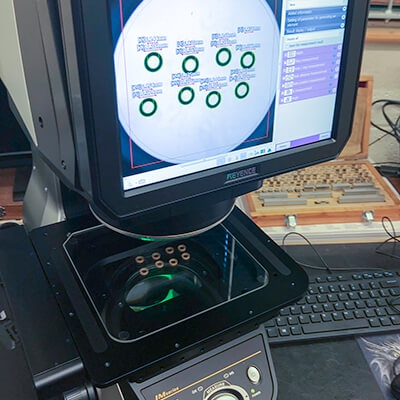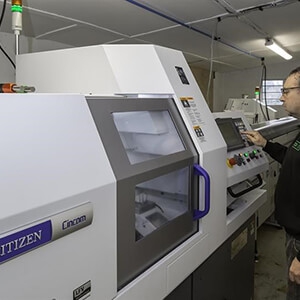- Contact 0870 350 7767
- |
- Advertise
Home > Plastic Turned Parts Ltd > Where moulding won’t do
Where moulding won’t do
 News and PR from Plastic Turned Parts Ltd - Published 12 December 2018
Two new sliding head lathes at Plastic Turned Parts are helping to fill the volume niche where injection moulding is not a viable option.
News and PR from Plastic Turned Parts Ltd - Published 12 December 2018
Two new sliding head lathes at Plastic Turned Parts are helping to fill the volume niche where injection moulding is not a viable option.
The two new machines, a Citizen L20 with its LFV technology and a Citizen B16E sliding head machine bring the total number of CNC lathes to 11, all of which are used solely for the machining of a wide range of plastic materials.
The investment is being driven by an increased demand for engineered plastic parts, with Plastic Turned Parts filling the volume niche were injection moulding is not viable due to time and cost restraints, such as quantities up to 150,000 and beyond or, where moulding is simply not an option due to the plastic material not capable of being moulded. “Everything we machine here is plastic and we are able to achieve much greater dimensional accuracy, with no concerns over shrinkage,” says Jonathan Newis, Managing Director. “These latest machines bring our total investment to over £400,000 in 2018, with four Citizen machines being installed, three of which have the latest LFV (Low Frequency Vibration) technology, which is ideal for machining plastics as swarf can be controlled precisely.”
Growth at Plastic Turned Parts is coming from old and new customers from a cross a diverse range of industries. One particular customer has increased its requirement for two specific components from 50,000 each, to 150,000 each, and one of the two new machines will be dedicated to that work. This increase is down to strong global sales among its customers and also an increase in reshoring parts. “Customers are seeing distinct advantages to having plastic parts machined rather than moulded, mainly around cost and timescale relating to manufacturing mould tools, but also the consistent quality that machining can bring. This is reflected in a very strong order book and as we operate KanBan systems with many of our customers, we have an insight into future order books, from this we see that the next 8-10 months are extremely positive. This level of interest and continued growth gives us the confidence to make these investments in capital equipment, as well as recruiting two new people into the business one as a setter and another as an operator.”
The investment is being driven by an increased demand for engineered plastic parts, with Plastic Turned Parts filling the volume niche were injection moulding is not viable due to time and cost restraints, such as quantities up to 150,000 and beyond or, where moulding is simply not an option due to the plastic material not capable of being moulded. “Everything we machine here is plastic and we are able to achieve much greater dimensional accuracy, with no concerns over shrinkage,” says Jonathan Newis, Managing Director. “These latest machines bring our total investment to over £400,000 in 2018, with four Citizen machines being installed, three of which have the latest LFV (Low Frequency Vibration) technology, which is ideal for machining plastics as swarf can be controlled precisely.”
Growth at Plastic Turned Parts is coming from old and new customers from a cross a diverse range of industries. One particular customer has increased its requirement for two specific components from 50,000 each, to 150,000 each, and one of the two new machines will be dedicated to that work. This increase is down to strong global sales among its customers and also an increase in reshoring parts. “Customers are seeing distinct advantages to having plastic parts machined rather than moulded, mainly around cost and timescale relating to manufacturing mould tools, but also the consistent quality that machining can bring. This is reflected in a very strong order book and as we operate KanBan systems with many of our customers, we have an insight into future order books, from this we see that the next 8-10 months are extremely positive. This level of interest and continued growth gives us the confidence to make these investments in capital equipment, as well as recruiting two new people into the business one as a setter and another as an operator.”
Other announcements from Plastic Turned Parts Ltd
-
Optical system speed throughput
Plastic Turned Parts has put the focus on metrology with a new optical system to speed inspection throughput.
11 Mar 2019
-
INVESTMENT AT PLASTIC TURNED PARTS TOPS £400,000 IN 2018
The recent arrival of two Citizen sliding-head lathes at Hertfordshire-based Plastic Turned Parts means the company’s total investment in 2018 has reached over £400,000.
12 Dec 2018






